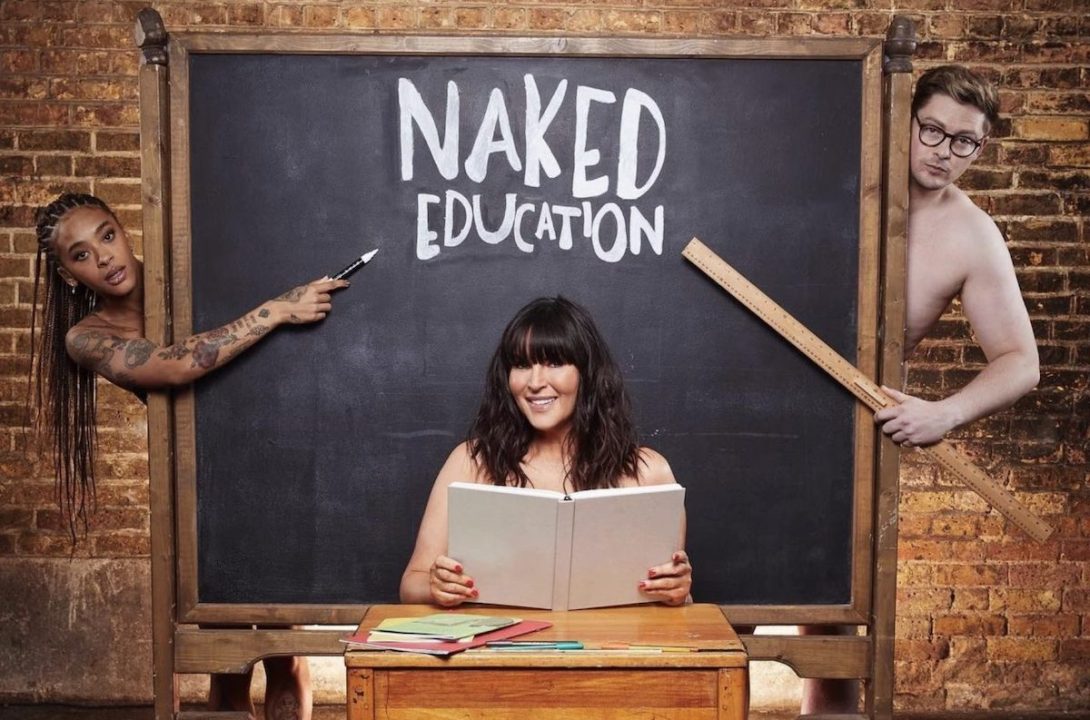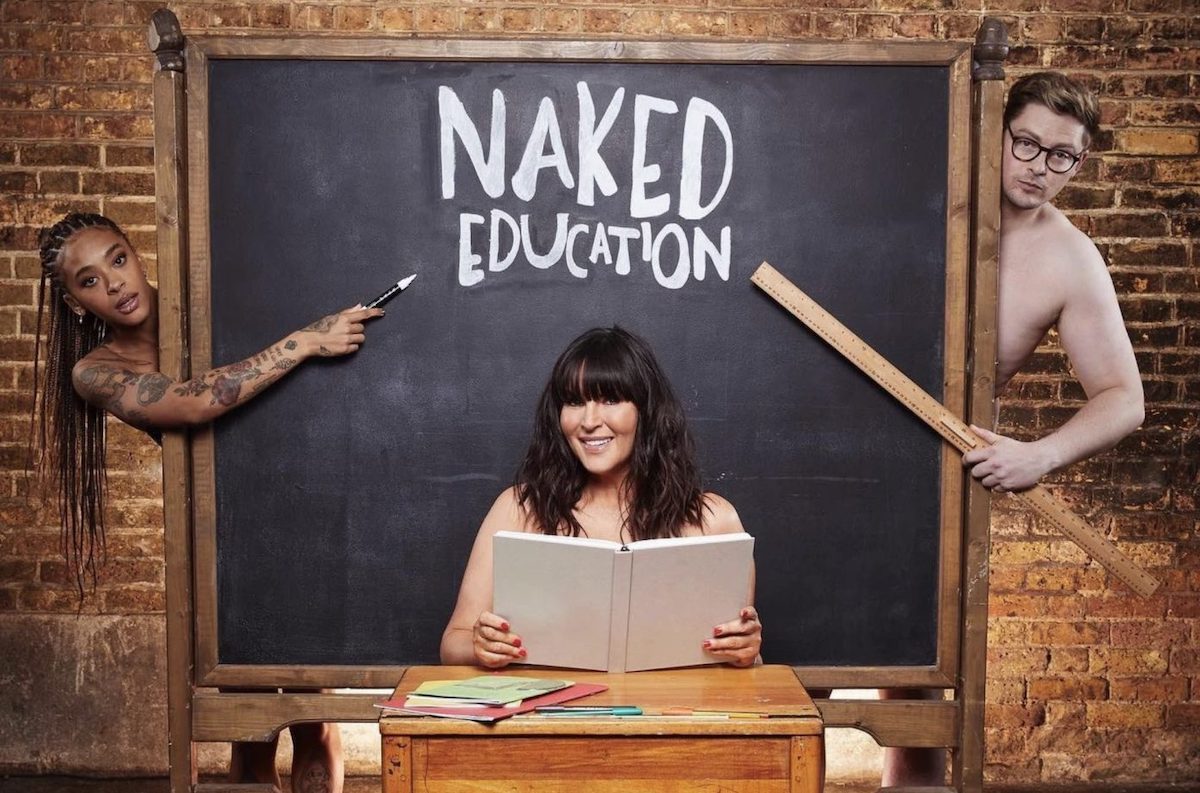When Channel 4’s new programme Naked Education – in which adults strip naked in front of children – was launched, it promised viewers it would be ‘all about body positivity’, and that it had a mission to ‘champion our differences and break down stereotypes’.
In the very first episode one of the participants, Martha, stated: ‘you have to accept yourself before you can love yourself’. Self-acceptance, from a therapeutic perspective, is extremely important.
Unfortunately, and perhaps unsurprisingly, the show, which is aimed at children, has already shown its inconsistent ideology. Entire segments are dedicated to individuals who seemingly did everything they could to change their bodies. The show then portrays them as the epitome of self-acceptance.
The focus of one episode was a conversation between Lucian and Finn, both of whom referred to themselves as ‘transmen’ (meaning they are biologically female).
Both Lucian and Finn discuss the ‘medical transition’ they had gone through or wanted to happen. They used the terms ‘gender affirming surgery’, ‘top surgery’, and ‘bottom surgery’. These terms are used euphemistically and do not get across the irreversible and potentially dangerous nature of such procedures.
The term ‘affirming’ is telling. Note how there is no explicit recognition of the fact that such surgery is fundamentally changing one’s body.
For a show that is designed to teach self-acceptance and body positivity, it was particularly striking when Lucian, who underwent a double mastectomy, said: ‘I was born in the wrong body… I never connected to my body… I can’t live in this body’.
Rather than the show’s ‘experts’ gently challenging this idea of being in the ‘wrong’ body and bringing the focus back to the importance of acceptance, we were instead told that such surgery is ‘amazing’. Lucian remarked thoughtfully: ‘I feel hot’.
Finn, who has had both double mastectomy and phalloplasty (the surgical creation of a penis) told viewers: ‘I’d always been a man and my body just hadn’t got the memo’. There is no evidence whatsoever to suggest that it is possible to be ‘born’ in the wrong body. Yet, this supposedly educational show left this statement unchallenged.
Again Finn’s double mastectomy was described in a deliberately euphemistic way as the ‘removal of breast tissue for a more male looking chest’. One could also describe it as: ‘the amputation of a completely healthy part of someone’s body’. But then again, this kind of statement probably wouldn’t appeal to Channel 4’s prime audience.
Finn went on to describe the phalloplasty, whimsically saying that ‘his penis’ is the same as any other penis. That is until we learn that ‘his penis’ is operated using an implanted erectile device, which must be pumped up using a saline solution stored in the abdomen and needs to be flushed out afterwards.
Finn went on to say: ‘I can still find my clitoris if I rummage under my testicles’. Not a sentence you usually expect to hear from a man.
At one stage, an opportunity presented itself to engage in deeper exploration of the discomfort and co-morbidities associated with ‘gender dysphoria’, a mental health condition. Finn described engaging in self-starvation when younger to avoid getting periods and stretches of self-abuse through drugs and alcohol.
Yet this was quickly sidestepped by the show, instead showing a photograph of Finn post-surgery, with a giant balloon reading ‘phallotastic’ on it.
At this stage, both Lucian and Finn stripped off to reveal their double mastectomy scars, both congratulating each other.
Finally, the show’s host, Anna Richardson, talked viewers through what can only be described as a shopping list of potential surgical options for ‘transitioning’, including hysterectomy. The closest we got to any caution or challenge is when Richardson said that each surgical option has ‘pros and cons’.
The above is striking for multiple reasons. It flies in the face of the entire notion of self-acceptance, instead suggesting to young viewers that if you don’t like a part of your body, you can simply change it.
This was particularly shocking given the other stories platformed by the show, including a young girl in tears as she recounted hating her breasts, and a woman who shared her battle with anorexia. Should they have simply changed their bodies?
The programme also showcased the stories of two brave women who had to undergo double mastectomies because of cancer. Listening to them only added to the feeling of sadness that young women are being encouraged to have completely healthy parts of their body removed.
More than anything, was the utter inconsistency. In an episode on cosmetic surgery, the show did its best to put children off such procedures. Dr Alex George stated despairingly: ‘what are we telling these children at age 14 if they want to go under the knife?’ The ‘experts’ spent time going through cosmetic procedures and listing out the significant risks associated with each one. Even a nose job, was described as ‘brutal’. Yet, in support of gender ideology, having one’s breasts or womb removed were portrayed as par for the course.
Equally, an entire episode focused on body dysmorphia, again from a stance of self-acceptance. Yet, there was no link whatsoever drawn between body dysmorphia and gender dysphoria.
Fleeting moments of the show felt more positive, particularly around bodily acceptance for those who have physical problems following medical trauma or underlying health conditions.
However, teaching young people that the answer to accepting oneself is to fundamentally change oneself through irreversible surgery is both utterly inconsistent and dangerously disingenuous.







Comments